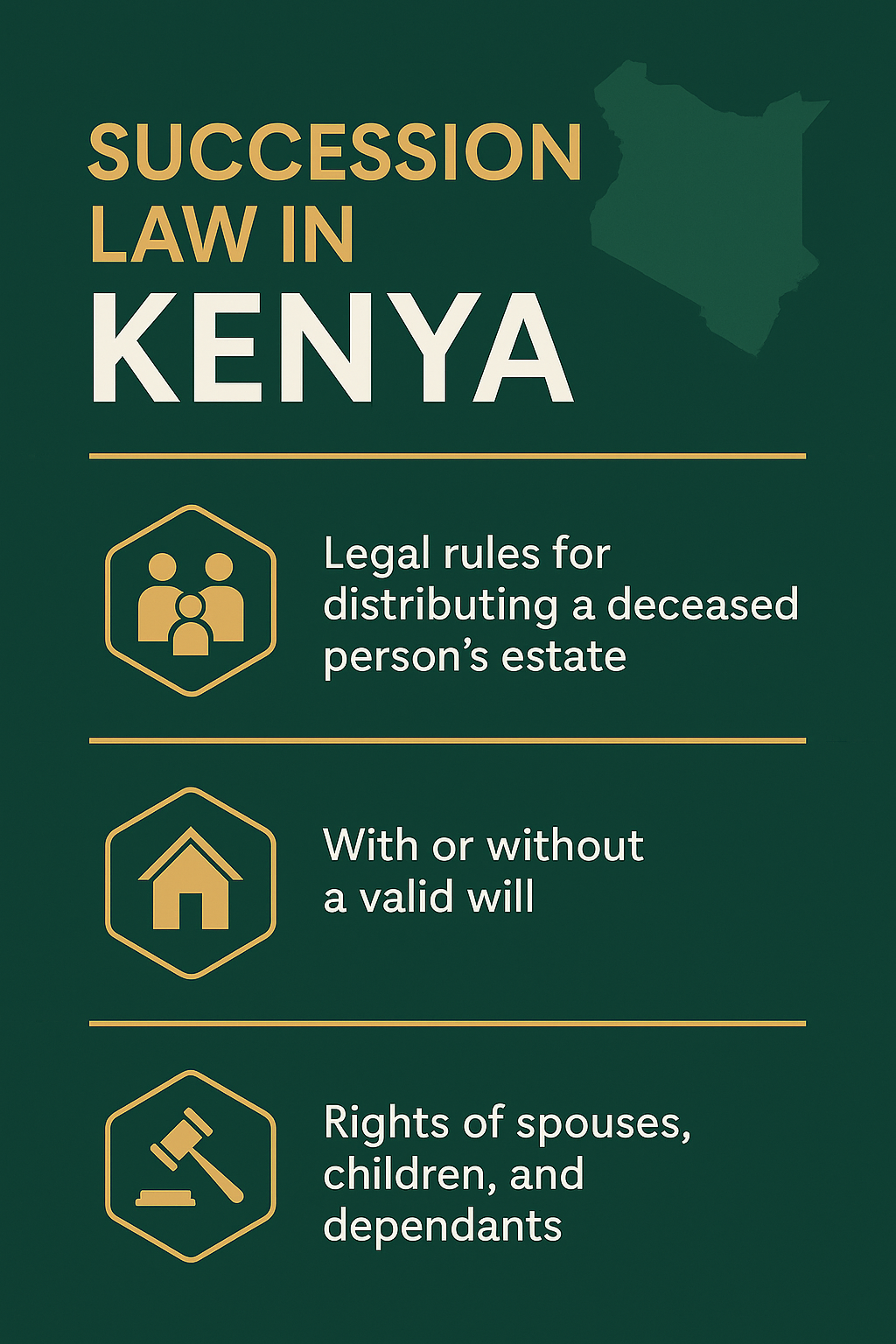Prenuptial Agreements in Kenya
Prenuptial Agreements in Kenya A prenuptial agreement often called a “prenup”is no longer reserved for the ultra-wealthy or celebrity couples. In Kenya today, more couples

Succession law in Kenya governs how a person’s property is handled upon their death whether they had a will or not. It affects every family, every business, and every individual who owns assets. Yet many Kenyans think about succession only after a crisis, leading to family disputes, frozen bank accounts, unclaimed financial assets, and long court battles.
Succession matters in Kenya are primarily governed by the Law of Succession Act (Cap 160) and its subsidiary laws. The key bodies involved include:
This is the main legislation governing:
Intestate succession (where someone dies without a will)
Distribution of estates
Rights of dependants
Grants of representation (probate & letters of administration)
These govern court procedures, including:
Filing for probate
Petitions for letters of administration
Publication notices
Objections and disputes
The High Court (Family Division) – Oversees probate and succession disputes.
The Public Trustee – Administers estates where beneficiaries are minors or disputes exist.
Chiefs & County Administration – Provide confirmation letters for dependants during intestate applications.
An estate includes everything a person owns at the time of death, including:
Land and houses
Bank accounts and investments
Shares, SACCO deposits, pensions
Motor vehicles
Businesses and partnerships
Digital assets (e.g., MPESA, PayPal, crypto wallets)
Debts, funeral expenses, and tax liabilities must be deducted before distribution.
If the deceased was married, matrimonial property laws determine what belongs to the surviving spouse before succession is applied.
A person can give away their property freely, BUT:
Gifts made shortly before death may be challenged.
The Married Persons Property Act protects spouses.
Dependants can contest gifts intended to disinherit them.
A person may:
Write a valid will disposing of their property.
Leave bequests to family, charities, or anyone they choose.
However, Kenya enforces forced heirship principles meaning certain dependants cannot be completely disinherited.
These include:
Spouse(s)
Children (biological, adopted, and sometimes stepchildren)
Parents (in limited cases)
Any person who was financially dependent on the deceased
Where a person attempts to give away their entire estate and leave nothing for the dependants, the law steps in.
A dependant can file a “dependant’s claim” under Section 26 of the Law of Succession Act.
The court can:
Cancel gifts
Reduce legacies
Redistribute the estate fairly
This protects vulnerable dependants from disinheritance.
If a Kenyan dies without a valid will, their estate is divided according to intestate succession rules.
The spouse receives:
Household goods and personal effects
A life interest in the remainder
Children inherit equally
When the spouse dies or remarries, the property devolves to the children
The spouse inherits the entire estate.
Children inherit the entire estate in equal shares.
The estate passes to:
Parents
Siblings
Half-siblings
Step-siblings
Extended relatives
Only if all fail does the estate revert to the State.
In Kenya:
Adopted children inherit just like biological children.
Children born out of wedlock also have equal inheritance rights.
Paternity can be established through DNA, documents, or conduct.
A valid Kenyan will must:
Be written
Be signed by the testator
Be witnessed by two competent witnesses
Other forms include:
Oral wills (valid only under strict conditions)
Statutory wills for persons in the armed forces
Foreign wills are also recognized if they follow the laws of the country where they were made.
Administration depends on whether the deceased left a will.
Executor named in the will applies for Probate.
Executor administers and distributes the estate.
Family members apply for Letters of Administration.
All heirs must consent.
Administrator(s) collect assets, pay debts, and distribute the estate.
If there are disputes, the court may appoint:
A Public Trustee
A neutral administrator
A professional executor (e.g., a law firm)
A will may be challenged on grounds of:
Coercion or undue influence
Fraud or forgery
Lack of mental capacity
Lack of proper witnessing
Dependants may also challenge:
Unfair distribution
Attempts to disinherit them
Questionable gifts given shortly before death
Parents or guardians manage minor children’s property, but major decisions require court oversight.
The court may appoint:
A guardian
A manager
A trustee
A person may also appoint someone in advance through a Power of Attorney.
Thousands of Kenyan families suffer delays, conflicts, and irreversible losses due to poor estate planning.
A well-planned estate ensures:
Protection of your dependants
Smooth transition of assets
Reduced disputes
Lower legal costs
Business continuity
Silvana & Associates Advocates is a premier corporate and private client law firm based in Nairobi, Kenya, offering specialized expertise in Succession Law, Estate Planning, Wealth Protection, and Family Business Continuity. We understand that legacy planning is one of the most important decisions individuals and families make. Our role is to bring clarity, security, and long-term protection to our clients’ assets ensuring that what they have built is seamlessly safeguarded and passed on to future generations.
If you’d like us to help you with anything about:
Please send us a message through the email address below.
Or click the WhatsApp Button to start a conversation.
Share on
Prenuptial Agreements in Kenya A prenuptial agreement often called a “prenup”is no longer reserved for the ultra-wealthy or celebrity couples. In Kenya today, more couples
Estate Planning Tips for Athletes: Protecting Your Wealth, Legacy, and Peace of Mind Professional athletes often earn significant income early in life, but their careers
Surrogacy agreements in Kenya What Is Surrogacy? Surrogacy is an arrangement where a woman (known as the surrogate mother) agrees to carry and give birth
Royal Offices |1st Floor | No. 17 Mogotio Rd, Off Chiromo Lane Westlands.
+254726328555
info@swkadvocates.com
Silvana & Associates. Advocates, Commissioner for Oaths & Notary Public.
Book Your Legal Consulting with us in less than 5 minutes.